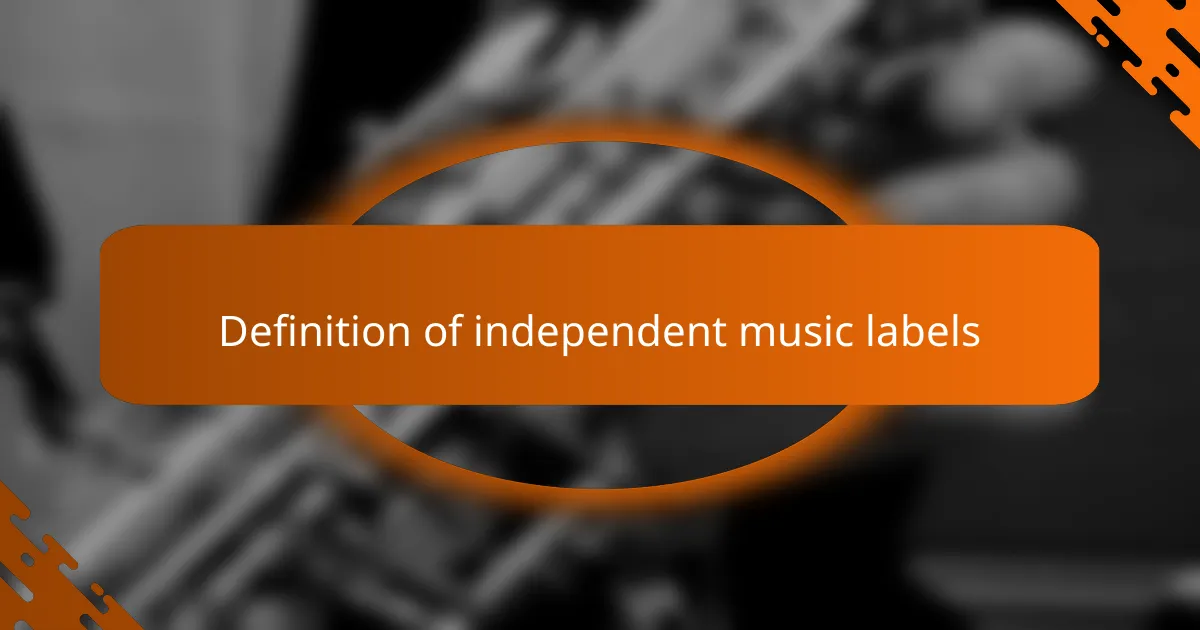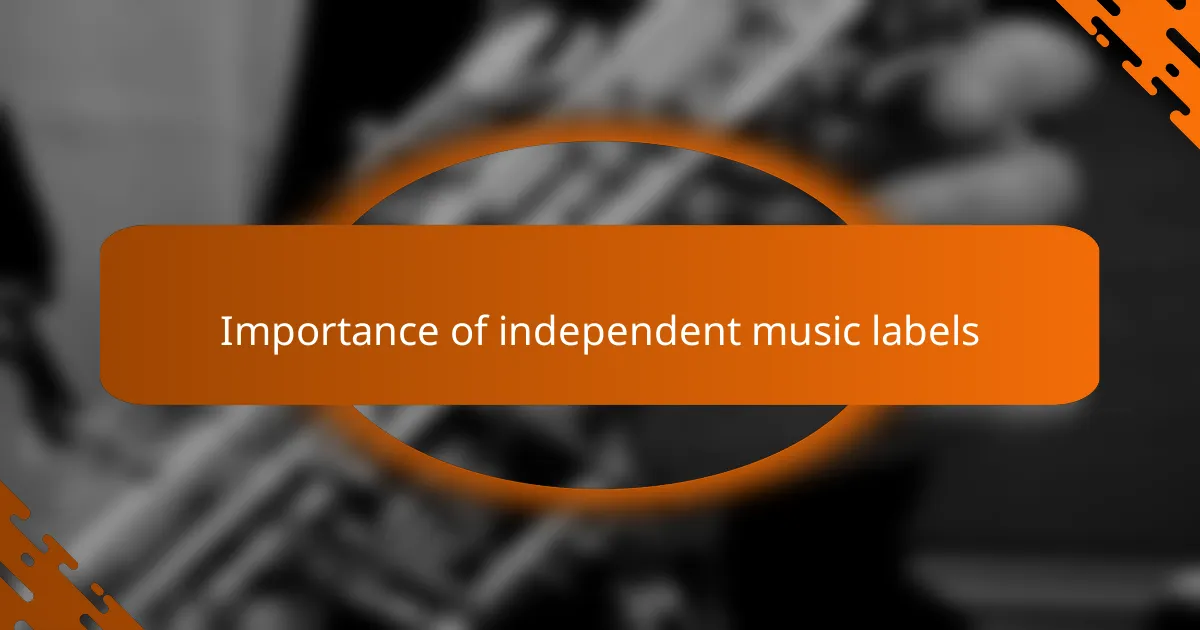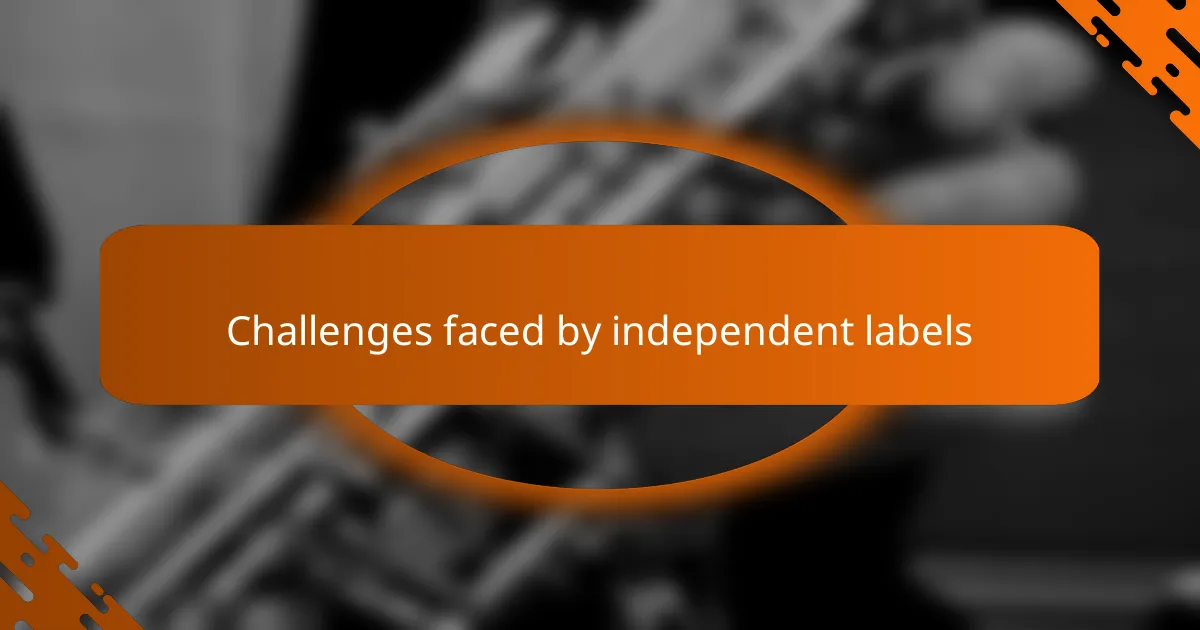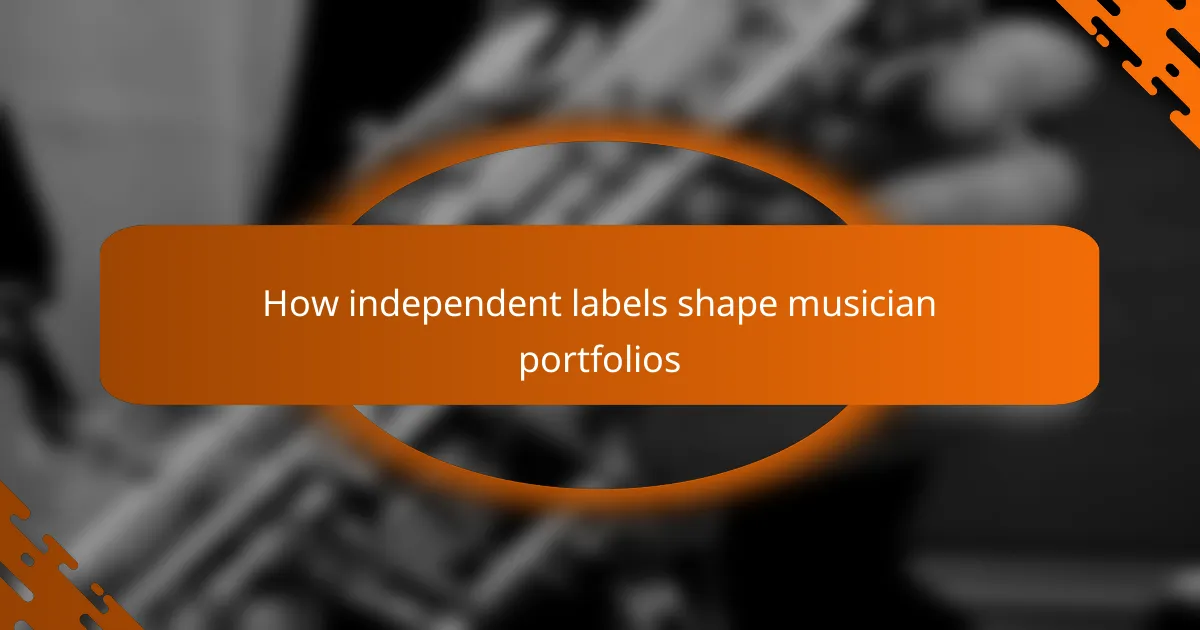Key takeaways
- Independent music labels prioritize artistic integrity and creative freedom, fostering diverse musical styles and authentic expression.
- They provide essential support for emerging artists, creating a sense of community and personalized marketing strategies tailored to individual visions.
- Challenges include limited financial resources, difficulties in distribution, and competition with major labels, which can hinder artist visibility.
- Independent labels contribute significantly to shaping musician portfolios by promoting artistic exploration and connection to local scenes.

Definition of independent music labels
Independent music labels are record companies that operate without the financial backing of major corporations. They often focus on nurturing talent and promoting unique sounds that may not fit into mainstream music expectations. I’ve always found it fascinating how these labels give artists the freedom to express themselves authentically.
These small entities typically prioritize artistic integrity over commercial success, allowing for a more diverse range of musical styles. I remember discovering a new artist on an independent label that completely captivated me with their raw storytelling and unconventional sound. It made me wonder: isn’t it remarkable how these labels can create a platform for voices that might otherwise go unheard?
Additionally, independent labels often foster close-knit relationships with their artists, giving them more control over their creative work. I’ve seen firsthand how this collaboration can lead to innovative music that resonates deeply with fans. The passion and commitment of these smaller labels can truly help shape the future of the music industry.

Importance of independent music labels
Independent music labels play a crucial role in nurturing artistic creativity. From my own experience as a musician, they offer an environment that encourages experimentation, unlike major labels focused on commercial success. I remember my first single release; the label allowed me the freedom to express my sound authentically, and that was empowering.
Additionally, independent music labels provide much-needed support for emerging artists, often helping them navigate the complexities of the music industry. They create a sense of community, where artists can connect, collaborate, and grow together, which is vital for personal and career development. Here are some key aspects that highlight their importance:
- Foster creative freedom and artistic development.
- Strengthen community among musicians and fans.
- Offer personalized marketing strategies tailored to the artist’s vision.
- Enable diverse musical genres to flourish outside mainstream trends.
- Provide hands-on support for distribution and promotion efforts.

Benefits of working with independent labels
Working with independent music labels can bring a wealth of benefits that often get overlooked. One notable advantage is the creative freedom they offer. For instance, when I collaborated with an independent label, I felt empowered to explore my sound without the constraints that larger labels impose. This freedom not only allowed me to grow as an artist, but it also deepened my connection with my music.
Another significant benefit is the close-knit community that independent labels foster. From my experience, the personal attention and support can be invaluable. I remember feeling like part of a family rather than just another signed artist, which motivated me to push my boundaries and connect more authentically with my audience.
Moreover, independent labels typically invest more time and resources into developing artists. This dedication can lead to stronger relationships and a more satisfying career trajectory. The passion that independent labels have for their artists often shines through in how they market and promote their music, making partnerships feel more like collaborations than contracts.
| Independent Labels | Major Labels |
|---|---|
| Creative Freedom | Limited Creative Control |
| Personal Attention | Less Individual Focus |
| Community Support | Corporate Environment |
| Higher Artist Development | Profit-Driven Strategies |

Challenges faced by independent labels
Independent music labels face a myriad of challenges that often stem from their smaller scale and limited resources. I recall my own experience collaborating with an indie label that struggled to secure adequate marketing funds. This often meant that great music went unheard, overshadowed by major label releases with higher budgets and greater visibility.
Moreover, independent labels frequently grapple with distribution issues. Artists signed to these labels may find it difficult to reach a wide audience, which can be frustrating. I remember helping a talented friend release their album through an indie label. They poured their heart into the project, but without the right distribution channels, it was tough for them to gain traction. It’s heart-wrenching to see passionate artists facing these hurdles.
Here are some key challenges faced by independent labels:
- Limited financial resources make marketing difficult.
- Difficulty in establishing distribution networks to reach a wider audience.
- Competing with major labels that have strong promotional power.
- Struggles with artist retention, as many artists seek opportunities with larger labels.
- Difficulty navigating legal and industry regulations without dedicated legal teams.

Personal experiences with independent labels
Working with independent labels has been a transformative experience for me as a musician. I remember my first interaction; they were enthusiastic about my sound, giving me creative freedom that larger labels simply wouldn’t offer. That connection fostered a sense of belonging and motivation, enabling me to explore my artistry without constraints.
Reflecting on those moments, I find that independent labels often provide the personal touch and support artists need to navigate the challenging music industry landscape. I’ve had the privilege of collaborating with passionate teams that genuinely believe in my work, turning what could have been a solitary journey into a shared adventure.
- Nurturing creativity: Independent labels often embrace unique sounds and styles that larger platforms might overlook.
- Building relationships: The close-knit atmosphere fosters collaboration and connection, making artists feel valued.
- Artist-centric approach: They prioritize the artist’s vision over commercial trends, allowing for more authentic music production.
- Local community focus: Many independent labels are strongly embedded in local scenes, promoting regional talent and culture.
- Flexibility in contracts: They tend to offer more favorable terms and conditions, allowing artists to retain more control over their work.

How independent labels shape musician portfolios
Independent labels play a crucial role in shaping musician portfolios by providing a platform that fosters creativity and artistic freedom. I’ve seen firsthand how these labels allow artists to explore diverse sounds without the constraints often imposed by major labels. It’s inspiring to watch musicians truly express themselves and develop a portfolio that reflects their unique journey and identity.
Moreover, independent labels tend to build closer relationships with their artists. This personalized approach often results in a more thoughtful curation of their work. I recall working with a local indie label that took the time to understand my vision, which led to a portfolio that not only showcased my music but also told my story.
- Artistic Freedom: Independent labels often prioritize creative expression over commercial success, allowing for a unique sound and vision.
- Personalized Support: These labels often form strong relationships with artists, leading to tailored guidance and promotion efforts.
- Diverse Portfolio Development: Musicians can experiment with various genres and styles without the pressure to conform to mainstream trends.
- Community Connection: Independent labels typically foster a sense of community, helping artists connect with their local scene and audiences.
- Niche Markets: They cater to specific genres or audiences, enabling musicians to reach dedicated fans who appreciate their work.